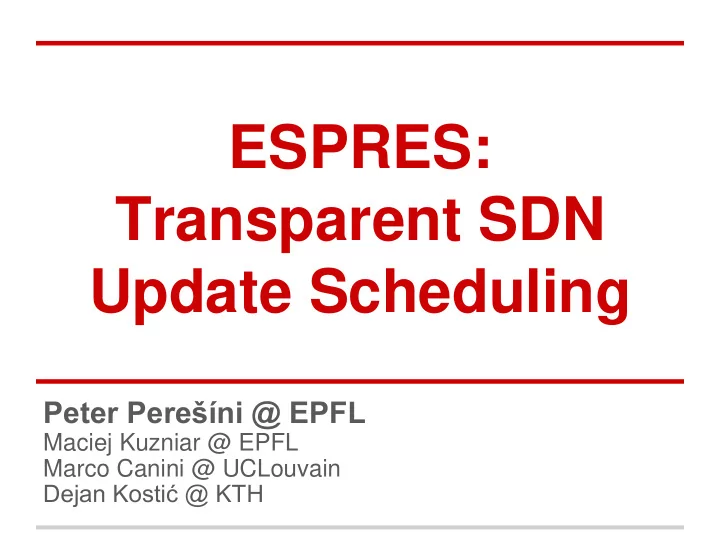

ESPRES: Transparent SDN Update Scheduling Peter Perešíni @ EPFL Maciej Kuzniar @ EPFL Marco Canini @ UCLouvain Dejan Kostić @ KTH
Network events trigger big updates Topology changes
Network events trigger big updates Topology changes
Network events trigger big updates Topology changes
Network events trigger big updates Topology changes
Network events trigger big updates Topology changes Traffic Engineering Policy changes
Network events trigger big updates Topology changes Traffic Engineering Policy changes Many rule modifications ⇨ updates take time
What if we reorder installations... Update touching two (independent) flows ● blue - 3 changes on a switch ● red - 2 changes on a switch
What if we reorder installations... Update touching two (independent) flows ● blue - 3 changes on a switch ● red - 2 changes on a switch
What if we reorder installations... Update touching two (independent) flows ● blue - 3 changes on a switch ● red - 2 changes on a switch
What if we reorder installations... Update touching two (independent) flows ● blue - 3 changes on a switch ● red - 2 changes on a switch vs
What if we reorder installations... Update touching two (independent) flows ● blue - 3 changes on a switch total time same ● red - 2 changes on a switch but different ordering of rule installation matters vs
Some challenges Scheduling sounds easy but ● multiple switches affected o and switch-speeds are different over time ● rule dependencies o e.g. update ingress only after core installed ● control channel is FIFO o no reordering
ESPRES overview (See paper for more details) ● Keep backlog of rule installations in ESPRES o enables re-ordering on control channel ● Schedule rules to be installed next o react on-the-fly to current switch conditions o needs to be fast o support flexible goals
Possible scheduling goals Already illustrated: ● install majority of flows sooner See paper: ● decrease mid-update rule overhead ● decrease transient instabilities
A taste of results 1000 new flows; 18 switches
A taste of results 1000 new flows; 18 switches ➢ No scheduling (send rule when dependencies are met)
A taste of results 1000 new flows; 18 switches ➢ No scheduling (send rule when dependencies are met) ➢ Espres A ➢ Espres B ➢ Optimal (Offline)
A taste of results 1000 new flows; 18 switches We reduce completion time by ≥40% for half of flows ➢ No scheduling (send rule when dependencies are met) ➢ Espres A ➢ Espres B ➢ Optimal (Offline)
Summary ● Updates touch many flows ● Changing rule installation order helps achieve different goals ESPRES ➢ Maintain backlog of rule installations at the controller ➢ Schedule their order on-the-fly
More recommend